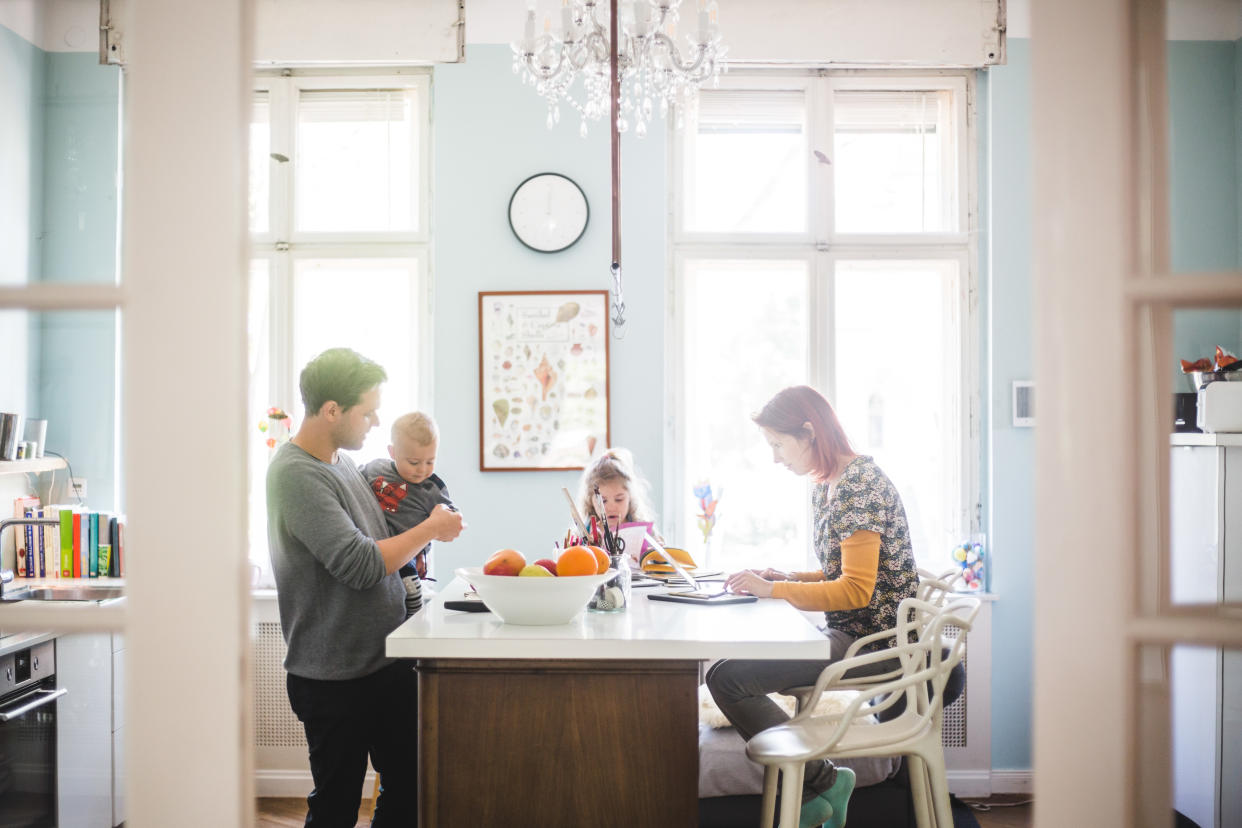How parents can keep the peace during lockdown: 'We are blazing new trails'

Dana, a mother-of-one in Los Angeles, loves being a yoga teacher — the part-time work indulges her fitness passion and gives her time with her 14 month-old son. But since the coronavirus swept through her state, forcing her husband, an essential employee, back to work, childcare is Dana’s responsibility, which makes her sapped and resentful.
“I’ve had no break from parenting, seven days a week,” Dana, who asked to use her first name only for privacy concerns, tells Yahoo Life. “I felt like my husband wasn’t helping out and he felt unappreciated.” With expanded parental roles and the question of how long stay-at-home orders would last, the couple of three years argued, sometimes in front of their son, and Dana wondered if their marriage would survive.
However, after crafting an equitable childcare schedule and committing to “suck it up” under quarantine, Dana says, “I feel like a human and a better mom and wife.”
Clustered at home with less personal space, some parents are struggling — according to The Knot x Lasting State of Relationships Report, which surveyed more than 1,000 users, which included both engaged couples as well as married couples who use its marriage health app Lasting, which is part of The Knot Worldwide brand.
One in 10 parents says the pandemic has “significantly weakened” their relationship, according to the survey results. Since mid-March, couples with kids are 20 percent less likely to comfortably discuss hard topics and are 31 percent less likely to resolve disagreements “in a healthy way” compared to pre-pandemic times.
“I don’t know that [families] have dealt with anything like this in modern history,” Carol Bruess, professor emeritus of family communication at St. Norbert College in Wis., and the author of What Happy Couples Do, tells Yahoo Life. “We are blazing new trails, but it’s also time to lean on what we know: patience and respect are essential for thriving relationships, but [lockdown], creates opportunities for conflict and contempt.”
For example, safety and cleaning should be non-negotiable areas for couples, says Los Angeles psychotherapist Bethany Marshall. Next, it’s important to clarify what “safe” means to both of you, as tasks like grocery shopping are now loaded. So, it’s important to address: Does your home have a no-shoe policy? Should kids wear masks outside? What does social distancing mean?
During disagreements, Marshall suggests “rescheduling” hot topics that get under people’s skin and rouse the amygdala, brain neurons that poke the “fight-or-flight” response, especially in front of children. A study in The Journal of Child Psychology and Psychiatry found that compared to “destructive” conflict (which is steeped in hostility), constructive arguing (with affectionate tones and support), increases children’s emotional security and prosocial behaviors. Parents can model this, says Bruess, by saving issues for age-appropriate family meetings.
Sharon, a New York elementary school teacher in “complete survival mode” tries to argue mindfully with her husband of 13 years. “We do have moments of tension and annoyance,” she tells Yahoo Life, adding that sex hasn’t happened since the pandemic began. Still, she and her husband, who are parents to two children, remind themselves to “always have the fight you’re having” by not revisiting old disputes and asking, “will this be important tomorrow or in one year?” for perspective.
Couples working at home together could try implementing office hours to respect each other’s space. “If you wouldn’t drop by each other’s jobs to complain, don’t do it during the workday,” Marshall tells Yahoo Life. “But do make time for coffee breaks.”
Both experts agree that typical family advice (i.e.: limiting screen time for kids) should take a backseat. “There are different rules in a pandemic,” says Marshall. “It’s OK to turn on the television in exchange for a private moment with your spouse.”
“Lower expectations,” adds Bruess. “If you’re in an especially fragile relationship, now is not the time to do things perfectly. It’s unrealistic under this type of pressure.”
Social distancing is a part of our everyday lives. The below experience allows you to place art in the space between. Place the image in front of you and move it around to line up with your loved one.
For the latest coronavirus news and updates, follow along at https://news.yahoo.com/coronavirus. According to experts, people over 60 and those who are immunocompromised continue to be the most at risk. If you have questions, please reference the CDC’s and WHO’s resource guides.
How to maintain your physical and mental health during the pandemic
Taking care of a loved one with COVID-19? Here’s how to stay healthy
Q&A with Dr. Kavita Patel: How to keep your family safe and maintain your mental health
Read more from Yahoo Life:
Want daily wellness, lifestyle and parenting news delivered to your inbox? Sign up here for Yahoo Life’s newsletter.


